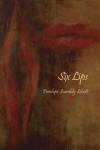Six Lips
In Six Lips, the poet Penelope Scambly Schott explores opposites and interconnectedness, in all its many forms. Her opening poem, “Compass” points us in that direction.
In Six Lips, the poet Penelope Scambly Schott explores opposites and interconnectedness, in all its many forms. Her opening poem, “Compass” points us in that direction.
In these landscapes, we encounter an obvious animal/human motif. At times, Schott is her human self living alongside the animal kingdom. But many times she is shape-shifting like the Shaman who becomes animal for a time. The poet, turned animal, is not irreversible as in the Greek god myths. Nor is this a punishment. For this writer, transformation is temporary, representative of her multi-faceted self.
Imbuing one’s self with animal attributes creates endless possibilities and images as in the poem “Can’t you do anything right?” when the poet declares to her mother that her “next birth / I will arrive with a golden garden snail / over each miniature thumb.” The poem takes a surprise turn when, instead of wearing snails on her thumbs, she morphs into one: “The stalks of my antennae / will rise in the air, their black eyespots / fixed on her dry lips.”
In other poems, even the inanimate turn animal-like. In Part 1 of “The Shawl Store,” the writer experiences a velvet shawl against her cheek as a seal. Part 2, the black feather shawl turns her into crow. She even warns readers: “When I show up as a crow, please don’t be shocked / you see, the truth is I have always been a crow.” Animal symbolism is furthered by the appearance of a long-haired wrap in “The Long Russian Movie of my Life.” In the garment poems we experience part-animal, as in the archetypal images of half-man/half-beast.
Shape-shifting is an ancient art; its medicine goes way back to the primitives. That is the thrill of Schott’s work, a reminder that this ability is not lost. It has found a way to resurface, this time through contemporary poetry.
Schott also explores incarnations suggesting that: “it was fun being a respected skunk” or “My life as a vulture was something else.” In “My Obituary,” the poet claims where one of her lives ends, another begins. She suggests the return may be in the form of an animal.
Yes, animals are inescapable in this collection. They come and they go. Their movements intrigue as in the poem, “Among the Other Animals” where Schott interacts with a leg-waving beetle, envies the salmon, answers a screech owl until, she says, “I become one in the common clan of beasts / the animal itself, akin to kin.” Sensing a kinship, she feels no separation.
Concerning voice, Schott’s poems declare. Wit ushers forth to disclose sexual acts and lively organs. For example, in the poem “Poor Dear,” there is rumination on penises: “Imagine the drag: / trailing it around / like some third leg / or a mailing tube.” Schott explores her marriage with poetic talk that carries personality. “[M]ine is the old silver-back on the right” she says of her husband in the poem “The Men in the Other Room.” In “Marriage Manua,l” we experience the directives she gives her husband for foreplay – those which, at first, aim toward undressing but then stop him suddenly with, “No, I told you, don’t mess with the breasts.”
That being said, there is also seriousness, where there falls a “fragment of sky into my throat as we kiss at the curb.” It is a kiss that flies with her across an entire continent so that in the end it becomes “the one thing that is close and the one thing that is far.” This is my favorite poem. The voice is lyrical, concise; with such beautiful treatment to language.
Other relatives surface, such as her younger sister that she guides into womanhood: “As if by teaching my sister the world, I could hold her.” Schott writes of her father’s death on an island, the place where “his blotched hands / lay open and loose on a summer sheet.” She writes of visits to her dying mother on the East coast, flights that signify a world of opposites. The heart is another reoccurring image, though each has a different beat: “Hobo Heart,” “Heart Failure,” “My Hard East Coast Heart.”
Her signature poem, of ten parts, is “Counting the Body.” It is curious to find Part 1 titled “One Tail, please.” In this poem the poet explores her body beyond body, parting herself open to reach the mythical self.
Part 6, titled “Six Lips,” is four lines. It is interesting to ponder why this small section becomes the book’s title; why the body parts – two of mouth and four of vulva – are carrying the weight of the book. Then again one need not be too analytical. These poems don’t require such dissection. Some seem to emerge from another realm, the subconscious perhaps. It is the reader who is challenged to awaken her/his imagination to experience the writer’s self-portrait. As Schott says of her seventh eye:
I would look inward:
I would study my own soul –
how it intends to keep living forever….
In Six Lips I feel she does just this. The poet goes inward for self-discovery as if entering the underworld. There she is greeted by animals and alter-realities. She has successfully taken all these glorious forms to the surface, where they become poetry on the page.





